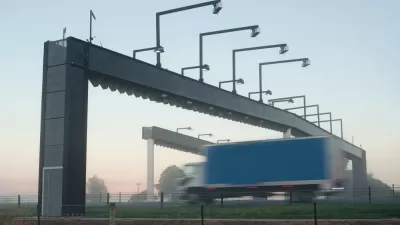The Bay Area's two regional agencies approved funding a study to pursue a 9-county "vehicle-miles-traveled" fee of as much as 10-cents per mile that could involve GPS technology to fund regional transportation improvements.
Mike Rosenburg reports that the study of the regional VMT fee, approved for funding by the Metropolitan Transportation Commission and the Association of Bay Area Governments on July 19, "is part of the long-term transportation and housing effort called Plan Bay Area, which also includes strategies like raising the Bay Bridge rush-hour toll from $6 to $8 and reducing the size of parking lots. The results are expected in December before the two agencies vote in April."
"The proposal is a long way from becoming reality. But under the scenario, drivers would likely have to install GPS-like trackers on their cars to tally travel in the nine-county Bay Area, from freeways to neighborhood streets, with only low-income people exempted."
The new fee "would likely need the OK from voters and the Legislature."
However, that wouldn't happen any time soon.
"A VMT charge is really an option for the future to be looked at and considered," said Randy Rentschler, spokesman for the Metropolitan Transportation Commission, the agency leading the effort. He said realistically the plan is so complex it might take a decade to implement if the public buys in."
Which would be just fine for Rosenberg's Bay Area News Group (pubisher of both Contra Costa Times and San Jose Mercury News), which did not pull any punches in its editorial on July 18, the day before the ABAG-MTC meeting.
"We are totally blown away by the creative audacity of Bay Area leaders proposing a per-mile tax on driving, maybe as early as next year, using -- wait for it -- a GPS-like tracker in every car to measure the distance it goes and the time of day the miles are racked up."
Perhaps they did not take Mr. Rentschler at his word in terms of the time required to formulate a VMT Fee proposal, let alone the legislative and plebiscite requirements. Or they just want to kill the idea entirely - which didn't work.
Thanks to MTC-ABAG Library
FULL STORY: Bay Area drivers could pay to drive each mile under tax proposal

Planetizen Federal Action Tracker
A weekly monitor of how Trump’s orders and actions are impacting planners and planning in America.

Maui's Vacation Rental Debate Turns Ugly
Verbal attacks, misinformation campaigns and fistfights plague a high-stakes debate to convert thousands of vacation rentals into long-term housing.

San Francisco Suspends Traffic Calming Amidst Record Deaths
Citing “a challenging fiscal landscape,” the city will cease the program on the heels of 42 traffic deaths, including 24 pedestrians.

Amtrak Rolls Out New Orleans to Alabama “Mardi Gras” Train
The new service will operate morning and evening departures between Mobile and New Orleans.

The Subversive Car-Free Guide to Trump's Great American Road Trip
Car-free ways to access Chicagoland’s best tourist attractions.

San Antonio and Austin are Fusing Into one Massive Megaregion
The region spanning the two central Texas cities is growing fast, posing challenges for local infrastructure and water supplies.
Urban Design for Planners 1: Software Tools
This six-course series explores essential urban design concepts using open source software and equips planners with the tools they need to participate fully in the urban design process.
Planning for Universal Design
Learn the tools for implementing Universal Design in planning regulations.
Heyer Gruel & Associates PA
JM Goldson LLC
Custer County Colorado
City of Camden Redevelopment Agency
City of Astoria
Transportation Research & Education Center (TREC) at Portland State University
Jefferson Parish Government
Camden Redevelopment Agency
City of Claremont



























